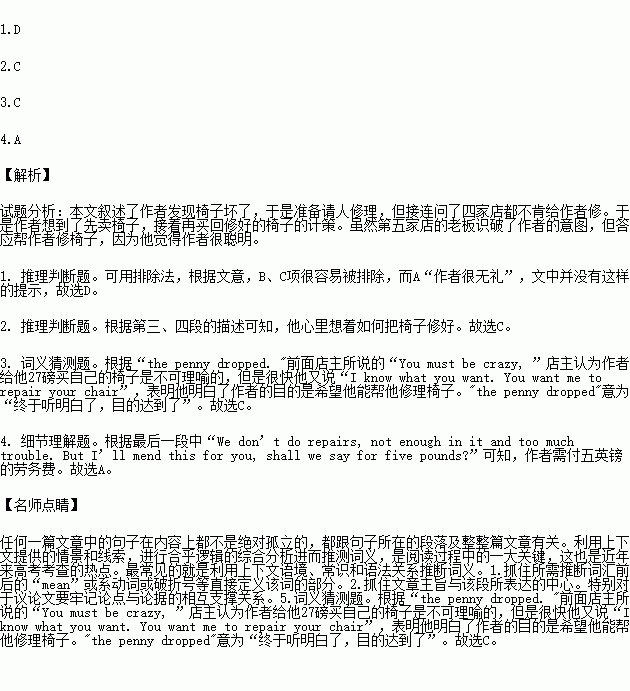题目内容
Some time ago, I discovered a whole lot of antique(古董) shops near my home. So I left home one morning carrying the char that had a broken leg. I didn’t think there would be any difficulty in getting it mended. I went into the first shop expecting a friendly reception. I was quite wrong. The man wouldn’t even look at my chair.
The second shop, although slightly more polite, was just the same, and the third and the fourth — so I thought that my approach must be wrong.
I went into the fifth shop with a plan in my mind. I placed the chair on the floor and said to the shopkeeper, “Would you like to buy a chair?” He looked it over carefully and said, “Yes. How much do you want do it, sir?” “Twenty pounds,” I said. “Ok,” he said, “I’ll give you twenty pounds.” “It has a slightly broken leg,” I said. “Yes, I saw that; it’s nothing.”
Everything was going according to the plan and I was getting excited. “What will you do with it?” I asked. “Oh, it will be easy to sell once the repair is done.” “I’ll buy it,” I said. “What do you mean? You’ve just sold it to me.” he said. “Yes, I know but I’ve changed my mind. I’m sorry. I’ll give you twenty-seven pounds for it.” “You must be crazy,” he said. Then, suddenly the penny dropped. “I know what you want. You want me to repair your chair.” “You’re right.” I said. “And what would you have done if I had walked in and said, ‘Would you mend this chair for me?’” “I wouldn’t have agreed to do it,” he said. “We don’t do repairs, not enough in it and too much trouble. But I’ll mend this for you, shall we say for five pounds?” He was a very nice man and was greatly amused by the whole thing.
1.We can learn from the text that in the first shop the writer ________.
A. was rather impolite
B. was warmly welcomed
C. asked the shopkeeper to buy his chair
D. asked the shopkeeper to repair his chair
2.Why did the writer said “Would you like to buy a chair?” in the fifth shop?
A. He was sure that he won’t be able to have the chair repaired.
B. He wanted to make some money by selling the chair.
C. He had a plan in mind about how to get his chair mended.
D. He planned to get a new chair after selling the broken one.
3.The expression “the penny dropped” in the last paragraph means the shopkeeper ________.
A. changed his mind
B. accepted the offer
C. saw the writer’s purpose
D. decided to help the writer
4.How much will the writer pay?
A. £5 B. £7 C. £20 D. £27
 黄冈天天练口算题卡系列答案
黄冈天天练口算题卡系列答案
